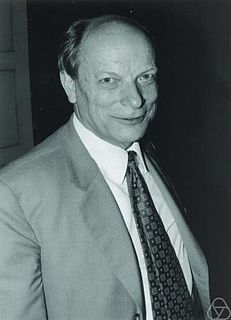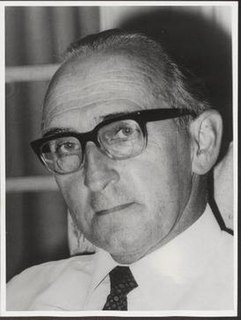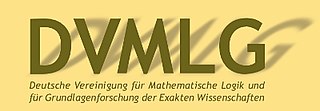
Arnold Oberschelp (born 5 February 1932 in Recklinghausen) is a German mathematician and logician. He was for many years professor of logic and science theory[ clarify ] in Kiel.

Arnold Oberschelp (born 5 February 1932 in Recklinghausen) is a German mathematician and logician. He was for many years professor of logic and science theory[ clarify ] in Kiel.
Oberschelp studied mathematics and physics at the universities of Göttingen and Münster. In Münster he received in December 1957 his doctorate in mathematical logic under Hans Hermes. [1] [2] [3] [4] In 1958 he was a research assistant at the Mathematical Institute of the Technical College of Hannover (now Leibniz University Hannover) where he habilitated in mathematics in 1961. [1] [5] In 1968, he accepted an appointment as full professor of logic and science at the University of Kiel. Oberschelp has been emeritus professor since 1997. [6]
Arnold Oberschelp developed a general class logic in which arbitrary classes can be formed without the contradictions of naive set theory. Additional axioms result in the Zermelo–Fraenkel set theory, which is much more handy in his class-logical representation than in the usual predicate logical representation. [7]
In 1962 he gave a lecture as an invited speaker at the International Congress of Mathematicians in Stockholm on classes as "primal elements" in set theory.
From 1970 to 1976 he was chairman of the Deutsche Vereinigung für mathematische Logik und für Grundlagenforschung der exakten Wissenschaften , [8] on whose board he served from 1965 to 1978.
In September 2019, he received the German Institute for Standardization's Beuth Memorial Coin in recognition of his services to standardization in mathematics and technical foundations. [9]
In mathematics, the axiom of regularity is an axiom of Zermelo–Fraenkel set theory that states that every non-empty set A contains an element that is disjoint from A. In first-order logic, the axiom reads:
Mathematical logic is the study of formal logic within mathematics. Major subareas include model theory, proof theory, set theory, and recursion theory. Research in mathematical logic commonly addresses the mathematical properties of formal systems of logic such as their expressive or deductive power. However, it can also include uses of logic to characterize correct mathematical reasoning or to establish foundations of mathematics.

Gerhard Karl Erich Gentzen was a German mathematician and logician. He made major contributions to the foundations of mathematics, proof theory, especially on natural deduction and sequent calculus. He died of starvation in a Soviet prison camp in Prague in 1945, having been interned as a German national after the Second World War.
In set theory, a universal set is a set which contains all objects, including itself. In set theory as usually formulated, it can be proven in multiple ways that a universal set does not exist. However, some non-standard variants of set theory include a universal set.
In set theory and related branches of mathematics, the von Neumann universe, or von Neumann hierarchy of sets, denoted by V, is the class of hereditary well-founded sets. This collection, which is formalized by Zermelo–Fraenkel set theory (ZFC), is often used to provide an interpretation or motivation of the axioms of ZFC. The concept is named after John von Neumann, although it was first published by Ernst Zermelo in 1930.

Abraham Fraenkel was a German-born Israeli mathematician. He was an early Zionist and the first Dean of Mathematics at the Hebrew University of Jerusalem. He is known for his contributions to axiomatic set theory, especially his additions to Ernst Zermelo's axioms, which resulted in the Zermelo–Fraenkel set theory.

Moses Ilyich Schönfinkel was a logician and mathematician, known for the invention of combinatory logic.
Non-well-founded set theories are variants of axiomatic set theory that allow sets to be elements of themselves and otherwise violate the rule of well-foundedness. In non-well-founded set theories, the foundation axiom of ZFC is replaced by axioms implying its negation.

Felix Bernstein, was a German Jewish mathematician known for proving in 1896 the Schröder–Bernstein theorem, a central result in set theory, and less well known for demonstrating in 1924 the correct blood group inheritance pattern of multiple alleles at one locus through statistical analysis.

Kurt Schütte was a German mathematician who worked on proof theory and ordinal analysis. The Feferman–Schütte ordinal, which he showed to be the precise ordinal bound for predicativity, is named after him. He was the doctoral advisor of 16 students, including Wolfgang Bibel, Wolfgang Maaß, Wolfram Pohlers, and Martin Wirsing.
In the mathematical field of set theory, the Solovay model is a model constructed by Robert M. Solovay (1970) in which all of the axioms of Zermelo–Fraenkel set theory (ZF) hold, exclusive of the axiom of choice, but in which all sets of real numbers are Lebesgue measurable. The construction relies on the existence of an inaccessible cardinal.
Günter Asser was a professor emeritus of logic and mathematics at the University of Greifswald. He published numerous volumes on philosophers and mathematicians. His own research was in computability theory.

Hans Hermes was a German mathematician and logician, who made significant contributions to the foundations of mathematical logic. Hermes was born in Neunkirchen, Germany.
Class logic is a logic in its broad sense, whose objects are called classes. In a narrower sense, one speaks of a class logic only if classes are described by a property of their elements. This class logic is thus a generalization of set theory, which allows only a limited consideration of classes.
In set theory, the Schröder–Bernstein theorem states that, if there exist injective functions f : A → B and g : B → A between the sets A and B, then there exists a bijective function h : A → B.

Bruno Baron von Freytag-Löringhoff was a German philosopher, mathematician and epistemologist. He was also a university lecturer at the University of Tübingen. During World War II, Freytag-Löringhoff worked as a mathematician in the In 7/VI, that was the signals intelligence agency of the Wehrmacht and worked with Fritz Menzer on the testing of cryptographic devices and procedures. Freytag-Löringhoff worked specifically on the testing of the m-40 cipher machine. His most important contributions to the history of logic and mathematics was his studies and descriptions from 1957, of the calculating machine, built by Wilhelm Schickard.

Friedrich Bachmann was a German mathematician who specialised in geometry and group theory.
Katrin Tent is a German mathematician specializing in group theory, the symmetries of groups, algebraic model theory, and finite geometry. She is a professor of mathematics and mathematical logic at the University of Münster.

The German Association for Mathematical Logic and for Basic Research in the Exact Sciences is the learned society representing the interdisciplinary research area of Logic (within the disciplines of Mathematics, Philosophy, Computer Science, and Linguistics) in German-speaking countries. It was founded in 1962 by Wilhelm Ackermann, Gisbert Hasenjaeger, Hans Hermes, Jürgen von Kempski, Paul Lorenzen, Arnold Schmidt, and Kurt Schütte. Its members are researchers in Mathematical Logic, Philosophical Logic, and Theoretical Computer Science. Biannually, the DVMLG organises the Colloquium Logicum, an international research conference in logic. The DVMLG forms the National Committee for Logic, Methodology and Philosophy of Science representing the Ordinary Member Germany within the Division of Logic, Methodology and Philosophy of Science and Technology (DLMPST).